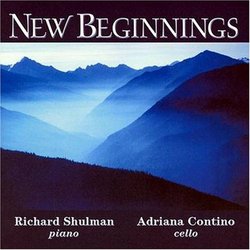From MainlyPiano.com
Kathy Parsons | Florence, OR United States | 04/09/2004
(5 out of 5 stars)
""New Beginnings" is a collection of composed and improvised duets by pianist Richard Shulman and cellist Adriana Contino. The pieces were recorded at a 2-hour recording session in NYC in 1989, and then mastered in 2003. Described as "the delicate balance of following the inspiration while listening to each other at the same time," the music is rich, deeply spiritual, and very satisfying. The combination of cello and piano is one of my favorites, and this duo does not disappoint! Contino has been the principal cellist for the Stuttgart Chamber Orchestra, and her roots are obviously very classical, but she is also a very capable improviser, making her cello to sing and soulfully soar as the music evolves.
Four of the seven tracks are improvisations, and three are pieces composed by Shulman. The title track opens the CD with the most joyful and upbeat piece on the album. Very jazzy in feeling and spirit, this is a great way to start! "Gustav's Lullabye" opens with the familiar strains of Brahms' lullaby, and becomes a soulful, peaceful improvisation - very quiet and soothing. "American Native Prayer" is a bit more abstract. It is an improvisation "honoring North America's Native people and the necessity of our reconnection to Mother Earth and All that Is." My favorite track is simply titled "Improv 1." At almost twelve minutes, this is truly a musical exploration. Haunting and melancholy, there is a real give and take between the piano and cello, pianist and cellist. I also really like "Song For Smitty," which is an improvisation on a theme by Contino. It begins with a cello solo, followed by a piano solo, and then a duet. Composed as a tribute to a "beautiful friend," the piece is mournful and incredibly beautiful. Free-flowing and unstructured, it is also hopeful and even a bit whimsical near the end - quite an interesting piece! Recommended to those who enjoy music with a classical feel, but also the freedom of improvisation by two masters of their instruments."


 Track Listings (7) - Disc #1
Track Listings (7) - Disc #1